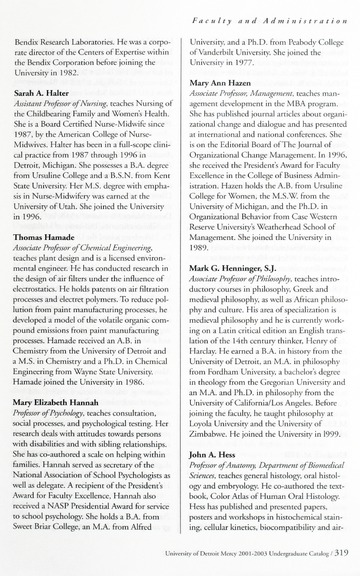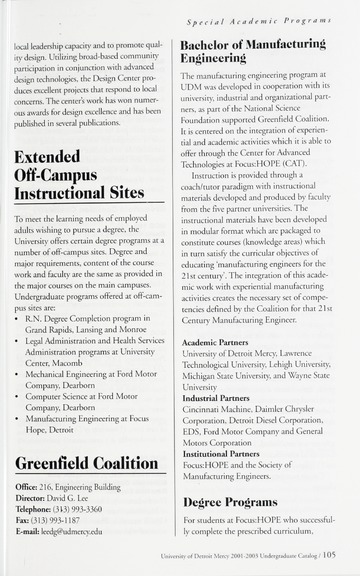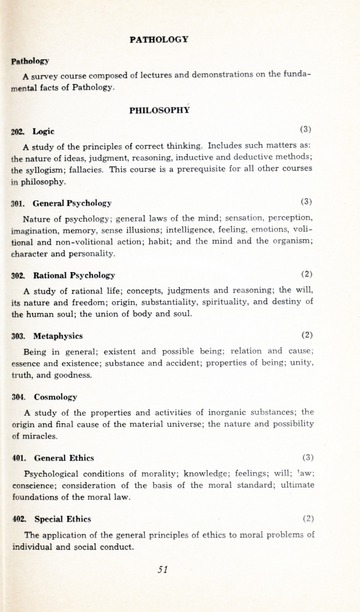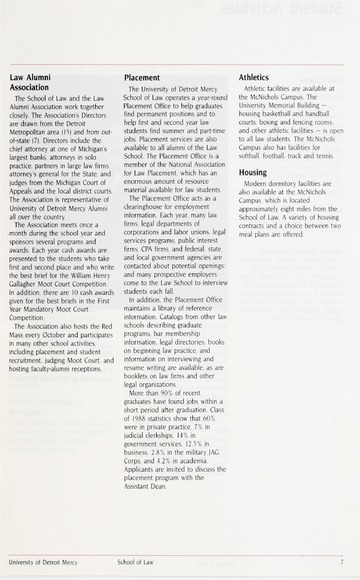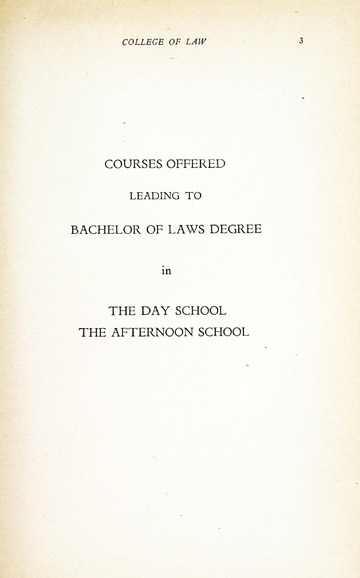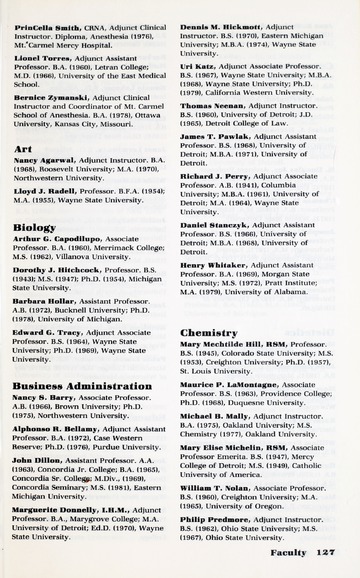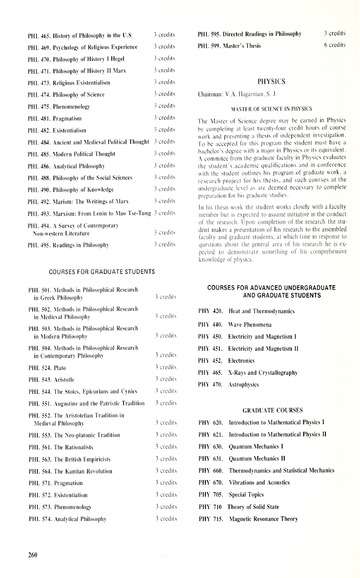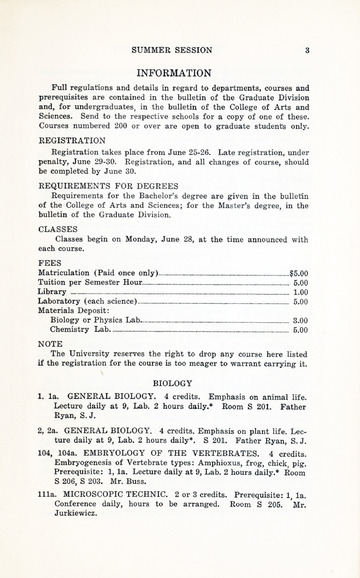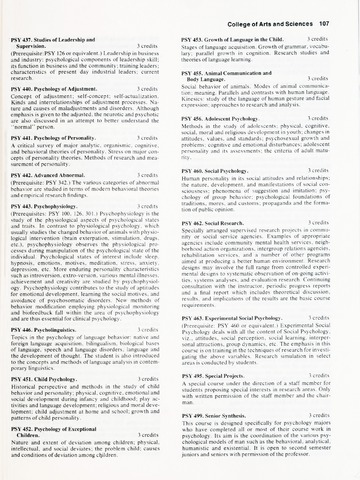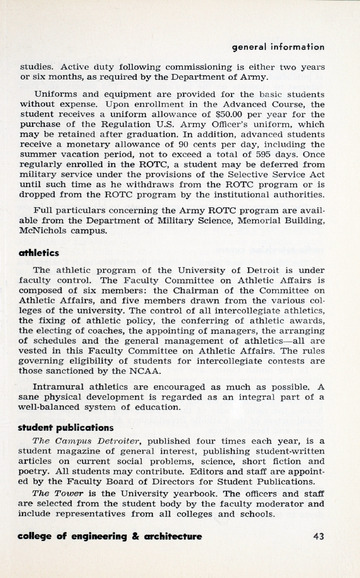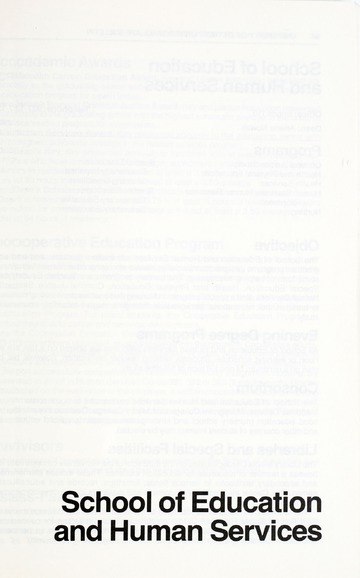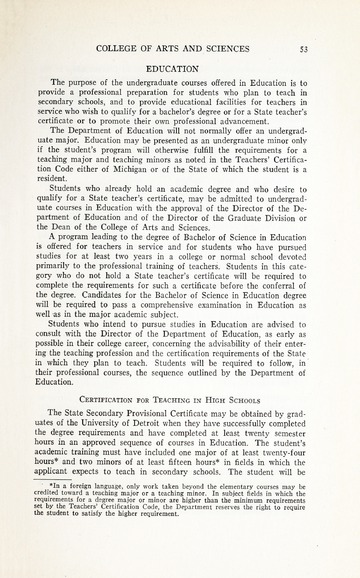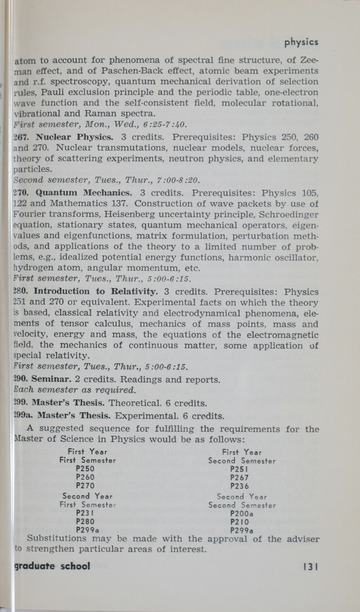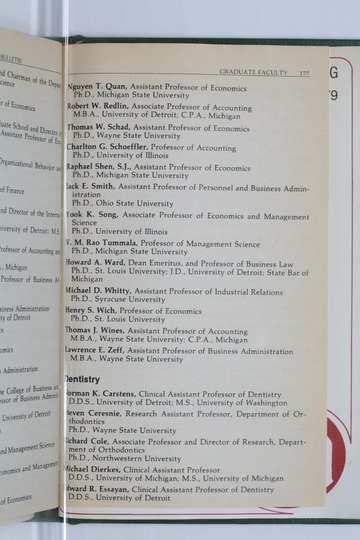The historical Undergraduate and Graduate Catalogs contain information about academic programs, course descriptions and student services offered by University of Detroit Mercy or the previous institutions known as Mercy College of Detroit and University of Detroit. The catalogs also contain general University and specific academic policies and degree requirements for the academic year that the catalog was published. In some cases the catalogs spanned more than one academic year. The catalogs are the primary source of academic information and are intended to complement other university information including specific materials supplied by schools, colleges, departments, and programs.
The listing of graduates and their degrees in the respective early catalogues and bulletins is preliminary in some cases and is subject to final certification of graduation. The posting of the earned degree on the permanent transcript record in the Office of the Registrar is the official testimony of possession of the degree. There may be names listed in each publication that may have not finished their degree requirements.
Historical Perspective
Production of the content in catalogues/bulletins has been an evolving process over the history of the institutions. During the early years each of the institutions used these publications to cover information well beyond course descriptions and degree requirements.
The first University Bulletin from Detroit College was published in 1877. Between 1877 and 1932 the bulletins included much more information than is found in recent catalogs. Beyond the description of the academic departments, and individual courses, the earlier publications included the University Calendar, faculty members, board of trustee members, scholarships awarded, honors lists, names of all class members and officers, and student organizations with officers. Detroit College bulletins from 1883 to 1915 listed all degrees conferred, years received and school. A notation was made for those alumni who were deceased.
A listing of all degrees conferred, year received, school, and if person was deceased by Detroit College was included in the bulletins from 1883 to 1915.
In the initial 1877 bulletin, a description of why Detroit College was established is included as an introduction to the bulletin: A.M.D.G. DETROIT COLLEGE
This Institution, conducted by Fathers of the Society of Jesus, has been founded for the purpose of imparting to the youth of Detroit instruction in the several branches of a Christian and liberal education. The culture of both heart and mind being the main object of education, the Faculty of Detroit College, in training students entrusted to their charge, combine religion and morality with literature and science.
No one, who may apply for admission to the College, will be refused on account of the religious opinions he may entertain, and no undue influence will be used to make a student change his religious belief.
From 1877/1878 until 1921/1922 the bulletins included "The High School" program.
"The instruction given in the High School Course, besides being a preparation for college, aims at imparting an education usually given in the best High Schools and Academics. It comprises four classes, corresponding to the four years’ course of approved High Schools.
As it is one of the main ends of education to develop in the youthful mind the habit of clear and accurate thinking, much attention is given the first year or two, to the analysis and synthesis of sentences, and in general, to the study of grammatical rules and principles….Much more stress is laid on the subject of Latin composition…..In Mathematics and other studies, the program here set down follows the usual division of subject in approved High School courses. The course in English is particularly thorough and complete…."
The Schedule of Studies, the Organizations within the school, and students registered in the High School are part of the bulletins.
The first Mercy College, conducted by the Religious Sisters of Mercy, Province of Detroit, Catalogue was published in 1942. The foreword to the first and subsequent catalogues includes a quote from Pope Pius XI, Christian Education of Youth (Divini illius magistri encyclical).
The proper and immediate end of a Christian education is to cooperate with divine grace in forming the true and perfect Christian….For precisely this reason Christian education takes in the whole aggregate of human life, physical and spiritual, intellectual and moral, individual, domestic and social, not with a view of reducing it in any way, but in order to elevate, regulate and perfect it, in accordance with the example and teaching of Christ.
As written in the 1942-1948 catalogues the Aims of the College included
In accordance with the principles of a Catholic philosophy of education, [later this statement was changed to "ideals of Mother Catherine McAuley, the foundress of the Institute of the Sisters of Mercy"] Mercy College aims:
To provide a broad general education and also the requisite technical training for Sisters engaged in the parochial school….and in the hospitals; and prepare the Sisters for advanced study in higher institutions.
To provide a liberal education for young women, with sufficient specialization in particular field to qualify those who wish to continue their studies on a higher level.
By its curricula leading to the degree of Bachelor of Science in Nursing, Nursing Education, and various fields of Health and Hospital Service to provide for young women who have chosen or who desire to enter these professions ....
In addition to the degrees offered and course descriptions, from 1942-1955 the catalogues included the names of the Board of Trustee members, administrative officers, faculty, standing committees of faculty, historical sketches, and admission requirements. Beginning in 1956 information on Student Life, student publications, academic honors, alumnae association, financial aid, etc. was added.
The Libraries Archive Research Center Special Collection includes the catalogues and bulletins published from the beginning through 2001. From 2002 through the present the catalogs are found on the university’s web site at http://www.udmercy.edu/catalog/rs for advanced study in higher institutions.
Author - Diane Praet, Associate VP and University Registrar
For assistance with this collection, please contact the the University Archivist, Mara Powell at 313-993-1950 or the library reference desk at 313-993-1071. You may also email the reference desk for assistance at edesk@udmercy.edu.




